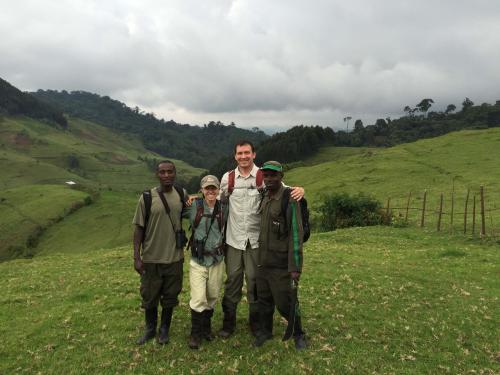A Forest of Hope
Rundus and Chancellor take the skills they learned through PFTF to the forests, people, and primates of Rwanda

When UC Davis Professors for the Future alumni Rebecca Chancellor, Ph.D. ’08 and Aaron Rundus, Ph.D. ’07 arrived at the Gishwati Forest of Rwanda, government officials and conservation organizations had recently described the forest as being “to the point of no return.”
Once one of Rwanda’s largest indigenous forests being more than 28,000 hectares, the Gishwati Forest had been reduced to 900 hectares of forest cover.
Timber and pine plantations, along with cattle ranching, cut the forest’s size by more than half during the 1980s. Then in 1994, the country experienced a tragic civil war and genocide resulting in more that 800,000 people being killed. This conflict and the violence that followed caused combatants and refugees alike to seek refuge in the Gishwati Forest for a number of years. Their cultivation of the land caused widespread deforestation. By 2001, only a small circular patch of native forest remained.
Leading primate research in Gishwati
Then, in 2008, the Rwandan government began working with the Great Ape Trust and Chancellor, a recent graduate of UC Davis who specializes in studying the behaviors of primates, became the principal investigator of the project. The project was focused on studying how living in a forest fragment affects chimpanzees. Soon the project blossomed and opened the opportunity for Rundus, whose research focuses on animal behavior and communication, to also work on the project.
Now called the Gishwati Primate Project, the husband-and-wife duo co-direct the study that includes researching numerous aspects of chimpanzee health, ranging behavior, foraging behavior, and issues of human-primate conflict. Chancellor and Rundus, who are both professors at West Chester University, also helped build a large field station in Gishwati, called the Shinehouse Gishwati Research Station. Prior to 2020, they were taking groups of up to 20 students to Rwanda each summer to study chimpanzees there. (COVID-19 imposed travel restrictions have prevented Chancellor and Rundus from visiting Rwanda for over a year now.)
Uplifting Gishwati communities
Their work, in addition to improving our understanding and conservation of this chimpanzee population, has had numerous other benefits on the surrounding communities.
The Gishwati Primate Project has helped propel a conservation effort for this forest as ecotourism within the area is seen as an asset by the local communities. In 2016, the Rwandan government designated the forest as part of the Gishwati Mukura National Park, recognizing Gishwati as an important area to be conserved and protected. Recently, community advocates and conservationists all over the world have begun to praise Gishwati as a “forest of hope” — particularly for its resilience in the face of decades of crises and degradation. The conservation efforts — which includes the work of Chancellor, Rundus, their team and partners — have successfully increased its size to some 1,500 hectares.
“It’s inspirational to think about how you can take a small forest and make an impact from both a conservation and community standpoint,” Rundus said. “This is our little way of doing something to help the chimpanzees, and to help the communities surrounding the forest. It may be a small contribution, but you can already see impact.”
From selling eggs to leading research
Their work has also transformed individual lives. For example, one of Chancellor and Rundus’ former master’s students, Sylvain Nyandwi, survived the Rwandan genocide and had to sell eggs on the street to make a living. After graduating from the University of Rwanda, he became connected with Chancellor and Rundus’ project, helping to conduct research. He is now a Ph.D. candidate and researcher at George Washington University, continuing to study the chimpanzees in Gishwati.
“We can do things that not only help with understanding chimpanzee conservation, but also make a real impact in the lives of people around Gishwati,” Rundus said.
Chancellor added, “Being part of those collaborations has been really rewarding for us.”
Well-rounded education
Chancellor and Rundus said they felt prepared to establish and grow the Shinehouse Gishwati Research Station and lead the Gishwati Primate Project together, both in Africa and from afar in the U.S., because of their time in Professors for the Future. The couple said PFTF taught them skills such as leading a team of graduate researchers, building collaborative partnerships, and securing funding for their research, as well as giving them the confidence to execute large-scale academic projects.
“It’s sort of a well-rounded approach to moving into an academic career because you’re not just looking at your research, you’re looking at all these other parts that go along with being an academic,” Chancellor said.
Rundus added, “The majority of academic positions that are out there are looking for people who are not only good at research, but have teaching skills and professional development. So the more students who are encouraged to look for these opportunities the better.”
Ahead of the game
The couple added that their PFTF experience played an important role in helping them secure faculty positions at the same university, a very difficult feat to accomplish, and allowing them to do work they love, together.
“There are so many things that you really need to have perfected by the time you apply because academic positions are so competitive these days. There were a number of different things we did for Professors for the Future that gave us an edge when applying for post docs and academic positions.,” Chancellor said. “Having that experience gives you the confidence to put those things together when you get to a future position. You learn to listen, and lead and organize, and those skills help to build your future career.”
Rundus added, “Getting a start while you are still in grad school puts you ahead of the game.”
